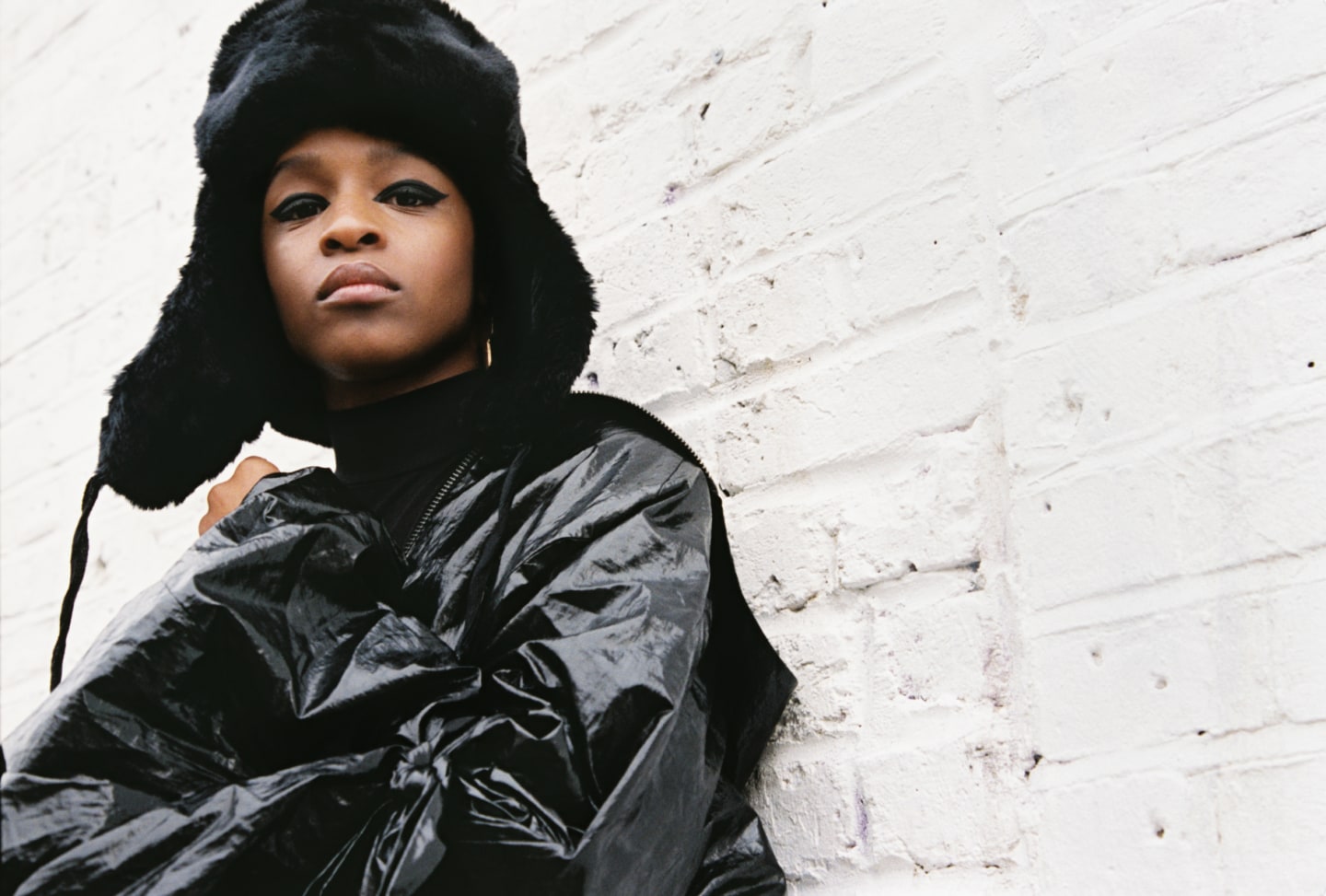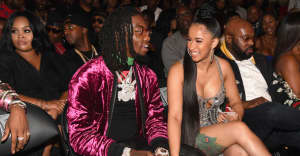How Julie Adenuga Became The Most Trusted Voice In U.K. Music
A conversation with the Beats 1 anchor about documenting grime, supporting the next generation, and the lessons she learned from her mom.

“I never got taught how to do radio,” Julie Adenuga said in a matter-of-fact style, before bursting into laughter. It was a bright day in December, and the 28-year-old radio DJ was reflecting on her self-started career. She was still wearing a lush fur coat and winged eyeliner from a photo shoot earlier that day, all gothic glamor behind her clear-framed spectacles. She spoke while multi-tasking with purpose, eating cheesy pizza with one hand, firing off emails with the other. “At no stage did I sit down and read a book about [DJing],” she continued. “I wouldn’t know how to do it professionally.” It’s this unstudied approach, she said, that helps create the no-bullshit feel of her Beats 1 show — and it’s true that her presenting has a casual, free-form feel that is a rarity elsewhere on mainstream radio. But whatever she tells you, Julie is a professional in her prime.
Julie’s career success isn’t rooted in books, but in her genuine roots and graft in London’s tight-knit music scene. Growing up in north London neighborhood Tottenham, she watched her older brothers Junior and Jamie (MCs Skepta and JME) launch their grime label Boy Better Know in 2005, but she wasn’t sure what she wanted to do herself. She was always creative — she studied dance in school, and sang backing vocals on JME's 2008 album Famous — but didn’t see herself becoming an artist. After dropping out of an Events Management degree, she worked in an Apple store for a little under two years. Feeling restless in 2010, she persuaded the then-pirate radio station Rinse FM to give her a show with her best friend Sian Anderson, despite neither having DJed before. The result was candid and hilarious: between the latest grime, afrobeats, and electronic music emerging from London, the two would spar and banter as though no one else was listening. Within five years, Sian was holding down a show on BBC Radio 1Xtra, and Julie was hosting the drivetime slot on Rinse. Listeners around the world learned her name in 2015, when she was chosen by Apple to anchor their new station, alongside seasoned pros Zane Lowe and Ebro Darden.
Julie’s transition to mainstream radio wasn’t just a victory for her personal career — it’s also been a big boost for artists who are often misunderstood by the U.K.’s broadcast media. In the grime and U.K. rap scenes in general, the prejudiced institutional press so often gets it wrong; artists find themselves labeled as “aggressive,” looked over for awards and radio play, and reviewed by journalists who have little understanding of their culture or lyricism. But Julie’s daily Beats 1 show feels authentic. As a day one music obsessive with a true understanding of how artists build careers, she knows exactly how to tread the line between amplifying culture and protecting what’s so special about it. Beyond radio, she’s also dedicated to opening up the music industry to young people from diverse backgrounds, launching the One True Calling mentorship scheme with Sian Anderson in 2016. As the world looks toward the U.K., Julie’s making sure the story of British music is being told right.


You and your siblings are all so creative and entrepreneurial. What were the best lessons your parents taught you growing up?
To have respect. In Nigerian culture, you can't give your mum or anyone older than you anything with your left hand. That's seen as disrespectful. If an auntie or uncle walks in a room, you touch the floor. Growing up as an English-born Nigerian person, there were just things that my friends at school weren't really going to understand. But I liked [those customs]. It's not a weakness to be a nice person.
What was it like for you growing up with all brothers?
I’m definitely not the girly type. I was so comfortable growing up as the only girl. I didn’t have to go play with my friends, in the house was where the fun was — with Junior, Jamie, Jason, mum, dad. I became uncomfortable when I went to secondary school, and had to be in an environment where people didn’t really understand me. It was a very strict line of, “There’s girls, and there’s guys.” I didn’t have any close female friends. I wasn’t like them. I didn’t have hairstyles, I didn’t even comb my hair. [I went] through these phases of like, doing girly things, and thinking, I don’t like this. Finding myself was basically going back to the original tomboy that I was, and remembering that I was cool.

“I want to encourage people to do stuff they’re passionate about. Putting positive energy out into the world.”
What surprised you in 2016?
Junior [Skepta]’s Mercury award! That was something that I never thought would happen. There were so many other people in that category — David Bowie, for a start. Everything that followed on from that, from Alexandra Palace, to shooting the documentary — everything felt so rewarding.
You wrote and presented Apple’s documentary on Skepta. Is it important to you to make sure that the right people are telling grime’s story?
I wouldn't want someone to tell Junior's story and not tell it right. I don't like seeing things wronged that are important to me. I think [that] ruins any credibility that that story had; every point you were trying to make is overshadowed by your incorrect information. Junior is such a delicate character, he's really easily misunderstood. [In interviews] he's so careful with what he says because he's aware that anything he does say can be taken left or right. [I thought], I probably am a good person to tell this story. Because I understand. Let me see what I can do to make sure that other people don't get it misconstrued.
On the flip side, do you ever get feel frustrated with being labeled a “grime” presenter/DJ, when you represent so many genres on your show?
I don't get frustrated, because it's never stopped me from doing something. When I was doing an interview for the documentary with Jamie [JME], he was talking about that moment [in the early-’00s] when loads of [grime] artists started signing record deals. I [asked] him, “How did that make you feel, as someone who's been so adamant about being independent?” He was like, "It was good, I liked that Kano, Chip, all these people were getting signed and spreading the sound, or spreading our culture, spreading that we exist to other people." For me, it's the same thing. If people feel like I'm a grime person, I like that I represent a grime person who's into other things. People think that [grime fans] just like grime, they don't listen to anything else. I'm a good representation of the fact that grime isn't just a secret club.

"All platforms should be accessible to all artists. A lot of music is celebrated, but [once] you reach a certain level, it’s only Adele."
There was a lot of talk last year about diversity at U.K. awards shows; do you think ceremonies like The BRITs need to improve?
Kanye West made me feel like awards are really bad! Because you work so hard, and then you have to be in competition with people when you didn’t even want to be. It’s not cool! Loads of people put work into their albums and then they have to lose. My [point of view] has always been, if you’re not 100% happy with how something is going, then you should just create your own — which is what [grime YouTube channel and publication] GRM Daily done with the Rated Awards.
If you could wave a magic wand and fix something about the U.K. music industry, what would it be?
I would change who you have to be to get to certain places. There are places that some artists will never be, because they are a person that isn’t normally accepted in that world. There are some artists that will never be on a late-night TV show, because they don’t fit into a certain box, because they don’t adhere to certain rules. I would change that. All platforms should be accessible to all artists. A lot of music is celebrated, but [once] you reach a certain level, it’s only Adele. I would change it so the English public can see all the types of music that exist out there.
How do we make that happen?
I need to make a late-night TV show!

What are you looking forward to in 2017?
Towards the end of [2016], I was very emotional about the world. Human beings have still not learned how to live on a planet with other human beings. [In 2017] I’m gonna try and do my part; I’d love for everyone to do their part, whatever that may be. I’m going to go to Greece for 10 days, because my friend is living out there — she used to work at a major label, but she quit her job [to start the charity Hope Project, building schools for refugees in Greece]. I’m launching a live music event this year as well, and I’m going to donate all the money from the ticket sales to [Hope Project].
On top of that, I am going to start a nice dinner [event] with [art director] Sophia Tassew, that should happen monthly or bi-monthly, for creative women to just come and have some food and talk about their lives with each other. I just want to have a place where [women] can mix with people that are older, in a different stage of their career. [I want to] encourage people to do stuff they’re passionate about. Putting positive energy out into the world.
Have you always been so confident?
I've always been loud. Sometimes people can mistake my loudness — when I was young, anyway — for confidence. In school, I was the outspoken, crazy one. But I think my confidence [came] from knowing that I'm confident about what I'm saying. Sometimes you can shout, and think: I'm shouting so people probably think I'm saying something that's right. But now, what I'm saying is something I believe in.

